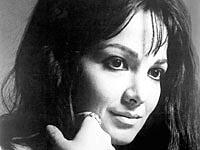Canadian Masters and their Works
Teresa Stratas – Lulu / Alban Berg – 1979 
Article by Jean-Pierre Sévigny
 Born into a Greek immigrant family living in the Toronto area, soprano Teresa Stratas (Anastasia Stratakis) recorded Alban Berg’s (1885-1935) opera Lulu in 1979 for Deutsche Grammophon. The director was Pierre Boulez, who had a very clear and analytical vision of this complex dodecaphonic (twelve-tone technique) work.
Born into a Greek immigrant family living in the Toronto area, soprano Teresa Stratas (Anastasia Stratakis) recorded Alban Berg’s (1885-1935) opera Lulu in 1979 for Deutsche Grammophon. The director was Pierre Boulez, who had a very clear and analytical vision of this complex dodecaphonic (twelve-tone technique) work.
Berg’s newly reconstructed three-act opera version, completed by Austrian composer Friedrich Cehra, was first performed at The Paris Opera in May 1979. The lavish production staged by Patrice Chéreau stunned the Parisian and international music scene. The New York Times described it as “perhaps the most important and glamorous operatic premiere since the Second World War.” For this occasion, The Paris Opera assembled a formidable cast of international singers, which included Yvonne Minton, Hanna Schwarz, Franz Mazura, but it was the electric, fiery performance by soprano Teresa Stratas in the title role which stunned people and garnered rave reviews.
Ms. Stratas – who has sung at all of the great opera houses of the world – imbued all of her performances with an almost febrile intensity. So complete was her identification with the characters she portrayed that many of her performances have taken on almost legendary status. Of her more than 50 operatic roles, however, it is her interpretation of Berg’s Lulu that perhaps best sums up her artistic credo.

As a singer and actress, Stratas made daring, emotional choices. She took risks. Most choices usually worked out, and many expressed deep artistic and spiritual convictions. The story of Lulu is a sordid one concerning sex, seduction, degradation, and betrayal. The title character is in many ways the ultimate representation of the post Romantic-era tragic figure of the femme fatale, a purely sensual being who only exists in the eyes and desires of men. Stratas’ Lulu is more victim, fallen angel than femme fatale. In Stratas’ performance, one finds redemption in the prostitute.
Stratas didn’t just sing the lead role, she inhabited the character and delivered an emotionally charged performance. For a mesmerized audience, she was a real living Lulu. In the tradition revisited by the other Greek opera superstar Maria Callas, Teresa Stratas doesn’t limit herself to a vocal “bel canto” performance (beautiful singing with elegant coded gestures), but she explores the dramatic, tragic dimension of the character Lulu in pure “melodrama” style. Here the singer must also infuse the vocal part with the feelings and raw emotions of the character. Lulu is a tormented, fractured woman. Stratas is able to convey that on every level as the voice with drama, a total art as envisioned by Wagner and his followers. Very few singers in modern opera could pull this off the way Stratas did.
When this historic recording was released, it won numerous prizes, including two Grammy Awards in 1980 – one for Best Opera Recording and another as Best Classical Album. Occasionally, recognition, sales and artistic merit are equal.
Links
http://www.thecanadianencyclopedia.com/index.cfm?PgNm=TCE&Params=U1ARTU0003318
http://www.avtrust.ca/masterworks/2005/en_soundrecording_1.htm